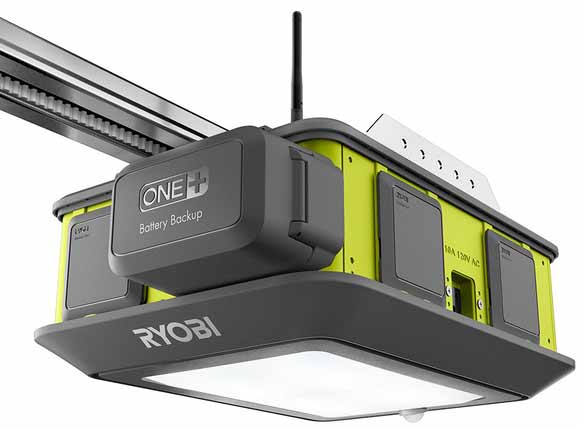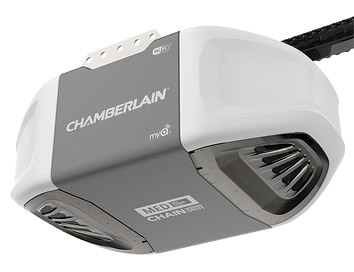In 2017, after a lengthy court battle, the Chamberlain Group, Inc. won their case against Techtronic Industries Co. Ltd., suing them for patent infringement related to specific connectivity features in their garage door opener systems.
A unanimous jury determined that Techtronic Industries (TTI) had infringed on two of Chamberlain’s patents. As a result, the court awarded Chamberlain $3.6 million in lost profits. Subsequently, Home Depot removed TTI-made products from its shelves, and Chamberlain was granted a permanent order to prevent the sales of TTI’s Ryobi GD200 and GD200A garage door openers.
Should garage door and door opener manufacturers be concerned and begin securing their patents?
Who Is Techtronic Industries?
Techtronic Industries, often referred to as TTI HK, is an investment holding company based in Hong Kong. They manufacture a range of products, including power tools, floor care products, and outdoor goods, all marketed under various brand names such as Milwaukee, Oreck, Hoover, and Ryobi. TTI HK, the defendant in this case, has multiple subsidiaries located in different parts of the United States and Asia, with TTI NA serving as the company’s primary North American subsidiary.

Techtronic Industries CEO Joseph Galli promoted the Ryobi garage door opener products, which were later accused of infringement, as a ‘very exciting opportunity’ for their primary retailer, Home Depot. He forecasted that they would generate $36 million in net sales with a 28% gross margin and an 8.7% EBIT in the first year, and grow to $45 million with a 33% gross margin and a 13.2% EBIT by the third year. Home Depot accepted the proposal, initiating the process of stocking Ryobi garage door openers on their shelves for retail sales.
Who Is Chamberlain?
Chamberlain, officially known as The Chamberlain Group Inc. (CGI), is a corporate parent company headquartered in Illinois. It encompasses several brands, including Liftmaster, Chamberlain, Merlin, Craftsman Openers, Clicker, CPSG Systems, and Grifco. CGI specializes in the design, manufacturing, and engineering of residential garage door openers, commercial door operation systems and gate entry systems.
It’s important to differentiate between Chamberlain, one of its brands, and Chamberlain Group Inc., the corporate parent company. The Chamberlain brand provides a range of light-duty DIY garage door openers, while its other brands, such as LiftMaster, are used by licensed garage door repair companies.

Several of Chamberlain’s patents are closely associated with their MyQ technology, which is integrated into their garage door openers and products. Chamberlain’s MyQ technology allowing users to make their garage door smart by connecting their garage door opener system to their home Wi-Fi network and control their garage doors with a smartphone app. It was only a matter of time before other garage door opener manufacturers attempted to incorporate similar technology into their products.
The Case of Chamberlain vs Techtronic
After an 8-day trial in the US District Court, Northern District of Illinois, CGI won their case against TTI, who were found guilty of willful patent infringement concerning CGI’s garage door opener products. The unanimous jury verdict was reached on August 30, 2017. TTI was found to have infringed two of CGI’s patents, effectively appropriating their garage door opener technology.
The Chamberlain Group was awarded the full $3.6 million in damages, intended to cover their lost profits due to patent infringements and subsequent unfair competition in the marketplace. Furthermore, U.S. District Judge Harry Leinenweber increased Chamberlain’s win from $3.6 million to $11.4 million.
These two patents covered distinct aspects of Chamberlain’s garage door opener technology, both of which are crucial to the company’s brand and product lines. The first patent pertained to the core garage door opener connectivity technology, allowing users to control their garage door opener system remotely through devices like smartphones and tablets.
The other patent for which TTI was found guilty of infringing covered the use of power tool batteries as backup batteries for garage door openers. This innovation was a unique selling point for the Chamberlain Group’s products.
The Faces Behind the Legal Battle
The Chamberlain Group Inc., represented by the law firm Fish & Richardson, known for its expertise in intellectual property and global litigation, assembled a skilled legal team. The team was led by Fish principal Ben Elacqua, Winston partners George Lombardi and Michael Rueckheim, and Winston Silicon Valley managing partner Kathi Vidal.
The legal team also included Fish associate Malena Stiteler and Winston associates Matt McCullough and Shanna Lehrman. Susan Bell, CGI’s general counsel, played a pivotal role in guiding the litigation strategy throughout the trial.
When asked about the trial, Ben Elacqua expressed respect for CGI’s innovation in the garage door opener industry, saying, ‘Chamberlain Group’s commitment to innovation in the industry is unmatched, from inventors to executives, and it was an honor to stand by their side alongside my Fish and Winston colleagues.’ Kathi Vidal shared the view that justice had been served, with the entire legal team clearly appreciating the Chamberlain Group’s dedication to protecting their intellectual property.
Leading the Way in Garage Door Opener Patents
The Chamberlain Group holds numerous patents, aiming to protect their innovations with the patent office. Their focus revolves around security, connectivity, and safety. Many of the features found in modern garage door openers today can be traced back to innovations pioneered by CGI over the years.
For instance, the photoelectric eye system, originally designed by CGI to prevent garage doors from closing on children, people, pets, and objects, is now a legal requirement. Another example is the automatic garage door deadbolt, which automatically locks after the garage door has closed and unlocks before it opens.
CGI also developed an encryption system known as Security + 2.0, which is a secure rolling code system integrated into their door openers. In the midst of the Internet of Things (IoT) revolution, the company introduced the ‘myQ Smart Access’ system – a mobile app enabling users to monitor and control their garage doors from virtually anywhere.
Competing in the Garage Door Opener Market
In the realm of overhead garage doors and garage door opener systems, manufacturers strive for a unique selling proposition (USP) to gain a competitive edge. Yet, it’s crucial to thoroughly scrutinize your inventions to ensure they don’t infringe on the patents of other companies, especially those with the financial and legal resources to engage in court battles.
Patents are a complex system, often broadly defined, making it challenging to determine the boundaries. In the competitive world of business, companies naturally seek to emulate or enhance each other’s ideas. However, how do you stay competitive without risking legal disputes for infringing on a competitor’s concept? Having a professional and valuable legal team is essential, whether you’re a garage door opener manufacturer or in any other industry.
The garage door opener industry doesn’t leave much room for change and innovation, especially in today’s interconnected world of smart devices, a factor involved in this particular infringement case. However, if a garage door opener manufacturer has a brilliant new idea, they should consider patenting it to prevent opportunistic theft.
What to Do If You Have a Ryobi Garage Door Opener?
If you have a Ryobi garage door opener installed in your garage, you’d need to replace it when it’s malfunctioning. This is often due to the unavailability of replacement parts, a situation that emerged as a result of the aforementioned lawsuit.







